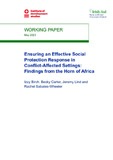Ensuring an Effective Social Protection Response in Conflict-Affected Settings: Findings from the Horn of Africa
| dc.contributor.author | Birch, Izzy | |
| dc.contributor.author | Carter, Becky | |
| dc.contributor.author | Lind, Jeremy | |
| dc.contributor.author | sabates-wheeler, rachel | |
| dc.coverage.spatial | Kenya | en |
| dc.coverage.spatial | Somalia | en |
| dc.coverage.spatial | Sudan | en |
| dc.date.accessioned | 2023-05-09T14:16:18Z | |
| dc.date.available | 2023-05-09T14:16:18Z | |
| dc.date.issued | 2023-05-09 | |
| dc.identifier.citation | Birch, I.; Carter, B.; Lind, J. and Sabates-Wheeler, R. (2023) Ensuring an Effective Social Protection Response in Conflict-Affected Settings: Findings from the Horn of Africa, Brighton: Institute of Development Studies, DOI: 10.19088/IDS.2023.020 | en |
| dc.identifier.isbn | 978-1-80470-114-0 | |
| dc.identifier.uri | https://opendocs.ids.ac.uk/opendocs/handle/20.500.12413/17948 | |
| dc.description.abstract | The interaction between social protection and conflict is an emerging area of study with particular relevance to the Horn of Africa, where conflict and political instability are habitual risks and where social protection is now a well-established field of intervention, including in response to climate-related shocks. Yet the connection between these two policy areas is poorly articulated. While frontline practitioners may be acutely aware of, and responsive to, conflict and political dynamics, these are less well reflected in the frameworks that guide social protection policy and programming. Where conflict is considered, it tends to be as a discrete shock rather than a chronic condition – the purpose being primarily to avoid doing further harm. The three country case studies on which this paper draws, along with a preliminary investigation of the literature, suggest a number of ways in which development partners could use their resources and leverage to strengthen the conflict sensitivity of social protection at both a strategic and operational level. A useful first step would be to facilitate deeper and more inclusive conversations on how social protection could engage with conflict dynamics in a more explicit and sustained way, with a view to making a positive contribution to peace in fragile contexts. | en |
| dc.description.sponsorship | Irish Aid, Government of Ireland | en |
| dc.language.iso | en | en |
| dc.publisher | Institute of Development Studies | en |
| dc.relation.ispartofseries | Working Paper; | |
| dc.rights | This is an Open Access paper distributed under the terms of the Creative Commons Attribution Non Commercial 4.0 International licence (CC BY-NC), which permits use, distribution and reproduction in any medium, provided the original authors and source are credited, any modifications or adaptations are indicated, and the work is not used for commercial purposes. | en |
| dc.rights.uri | http://creativecommons.org/licenses/by-nc/4.0/ | en |
| dc.subject | Politics and Power | en |
| dc.subject | Security and Conflict | en |
| dc.subject | Social Protection | en |
| dc.title | Ensuring an Effective Social Protection Response in Conflict-Affected Settings: Findings from the Horn of Africa | en |
| dc.type | Series paper (IDS) | en |
| dc.rights.holder | Institute of Development Studies | en |
| dc.identifier.team | Rural Futures | en |
| dc.identifier.doi | 10.19088/IDS.2023.020 | |
| dcterms.dateAccepted | 2023-05-09 | |
| rioxxterms.funder | Default funder | en |
| rioxxterms.version | VoR | en |
| rioxxterms.versionofrecord | 10.19088/IDS.2023.020 | en |
| atmire.atmiredoc.corrheight |
Files in this item
This item appears in the following Collection(s)
Except where otherwise noted, this item's license is described as This is an Open Access paper distributed under the terms of the Creative Commons Attribution Non Commercial 4.0 International licence (CC BY-NC), which permits use, distribution and reproduction in any medium, provided the original authors and source are credited, any modifications or adaptations are indicated, and the work is not used for commercial purposes.


